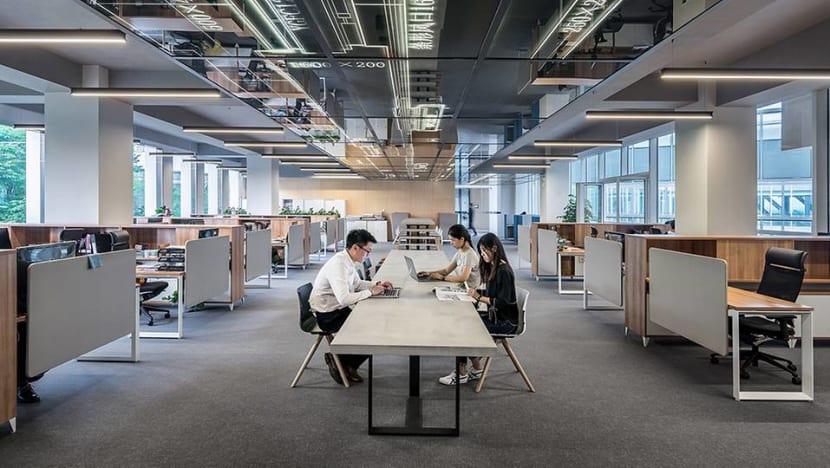commentary Commentary
Commentary: Complying with a 52-hour work week cap should not be this hard
Three in five firms in South Korea have found it hard to meet the new legislation, which kicked in last year and aimed to tackle the country’s notoriously long work hours, says Steven Borowiec.

(Photo: Unsplash/LYCS Architecture)
SEOUL: If you ask many young South Koreans about their professional ambitions, a large portion of them will answer: “To get a job at a big company.”
This preference for size often comes ahead of what type of work they aspire to do or what goals they have for their career.
READ: Commentary: South Korean workers have been bullied for far too long
In South Korea, there is a growing sense that only the economy’s big players are able to provide employees with stability and decent compensation over one’s lifetime. Chaebols (South Korean business conglomerates) have been seen as top choices for university graduates.
A job at one of the top companies that dominate the South Korean economy comes with a high salary, job security, and a measure of social prestige.
A TOUGH LIFE IN A SMALL FIRM
At the other end of the economy, however, those who aren’t fortunate to land a position in a corporate conglomerate – i.e. most of the workforce – are left to toil in small and medium enterprises, working longer hours while earning far less and enjoying less generous benefits.
It gets worse the further one goes down the company-size scale. Data from South Korea’s national statistics agency shows that 5.8 million people (one in five in the labour workforce) work in companies with five or fewer employees.
READ: Commentary: Always tired and worried about under-performing — when extreme meritocracy drives burn-out
Workers at companies of that size exist outside of the law and are not entitled to the protections of South Korean labour regulations.
They function this way on the premise that the only way those firms can survive is because employees work late at night and on weekends for no extra pay, health insurance or pension contributions.
A GOVERNMENT’S PRIORITY

Narrowing this employment market polarisation, and easing inequality more generally, has been a key priority of the current South Korean government’s policy agenda.
Since taking office in 2017, the Moon Jae-in administration has raised the minimum wage and slashed the number of hours people can legally work from 68 to 52.
Aside from combating South Korea’s toxic work culture of long hours, the economic reasoning was that instead of doing what Korean companies have traditionally done – pushing employees to work some of the longest hours in the world in the name of collective sacrifice – companies would have to hire more, thereby boosting employment and consumption.
READ: Commentary: Are you a bullying manager? It's easy to tell
The limit would also allow workers more time to spend with loved ones or enjoy leisure activities, the government said.
These curbs went into effect for large companies in July 2018, but firms with fewer than 300 employees were given a grace period before they had to comply.
SMALL FIRMS FACE TROUBLE
That period is set to come to an end next year for companies with 50 to 299 employees.
But for such companies, many are already finding it difficult to adjust their operations to comply with these new restrictions. They also cannot afford to do any of the new hiring the policy intended to inspire.
Over drinks on Friday night, the owner of a boutique public relations agency told me that with the current minimum wage and abundant government red tape, his company often finds hiring to be more trouble than it’s worth.

He said he often has to tell interns happy to remain on the job at their current wage that government regulations require him to let them go.
Under South Korea’s two-tier employment system, contract workers can only work for a fixed period before companies must either hire them permanently or let them go. If hired, they’re almost impossible to retrench.
He is far from alone among business owners. Almost 60 per cent of companies say they still require more flexible deployment of labour to allow workers to work extra hours at times when there is more to do, according to the results of a recent survey by the Korea Chamber of Commerce.
VULNERABLE WORKERS
On the other end of the spectrum, groups representing workers argue that the system is too flexible already, that employers have too much leeway to bring on workers when it suits them, without guaranteeing them stable jobs.
Gabjil119, a workers’ rights civic group based in Seoul, is lobbying the government to phase out South Korea’s system of widespread and growing use of dispatch and contract employment, which can leave workers more vulnerable to mistreatment or lost wages.
READ: Commentary: Workers in the gig economy feel lonely, anxious and powerless
Park Jum-kyu, a co-founder of Gabjil119, told me he and his colleagues think there are tougher tasks ahead.
He thinks that despite the law, Korean employers still haven’t changed their predilection to squeeze workers for all they can while paying them as little as they can get away with, knowing that Korea’s culture of collectivism makes individuals reluctant to speak out.
FIXING THE STRUCTURE OF THE ECONOMY
But now is the time to speak out and to push forward an uncomfortable debate.

This conversation around working hours fits into a bigger discourse around what is sometimes called “late capitalism” - an era in which the old market economy delivers a decent life to an ever shrinking few.
It has important things in common with the debate over minimum wage in South Korea, and other developed countries, where, on one hand, you have workers who say the conditions of their jobs are denying them a dignified life, while on the other you have employers who argue that their businesses will go under if they are legally obligated to treat workers any better.
READ: Commentary: The dark side of corporate perks, how some companies exert control over workers
Surely there are some South Korean companies who are hanging on by a string and would go under if they had to comply with labour laws.
But that’s also a sign that something is seriously wrong with the country’s economic model, which piecemeal measures like grace periods or wage adjustments won’t fix.
South Koreans also consistently pull in some of the longest working hours among OECD countries, which Family Minister Chung Hyun-back calls “inhumanely long". Many are exhausted and miserable.
READ: Commentary: What’s behind burnout? Confusing long hours and face time for work performance
The current South Korean government deserves credit for trying something different to address an underperforming economy, with initiatives distinct from the neoliberal measures that have played a role in growing inequality around the world.
Time will tell if the caps on working hours and assorted measures help or hurt the economy, but they are valuable in pushing South Korea slightly closer to figuring out how to fix an economy that only works for a few big companies.
Steven Borowiec is the politics editor of Korea Expose.















